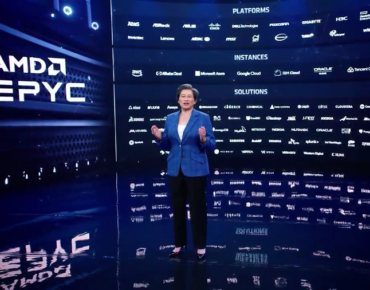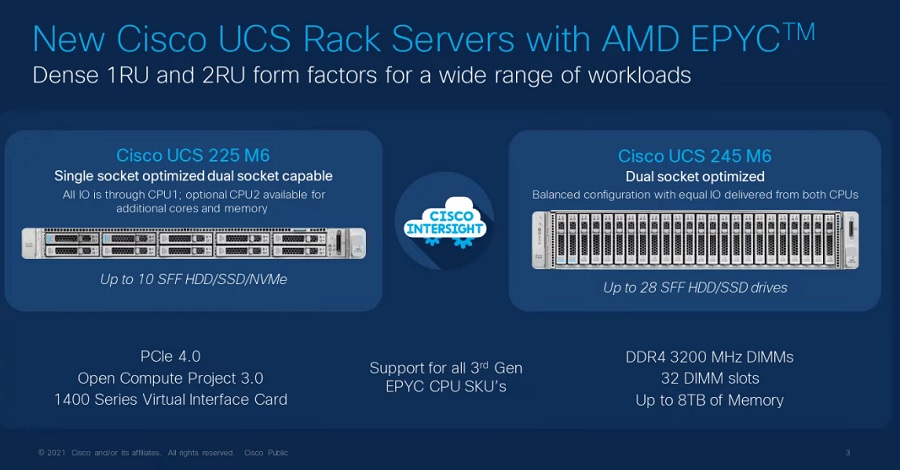AMD Partners Unveil Their Plans for Integrating New AMD Epyc CPUs in Servers, Services

Now that AMD unveiled its latest third-generation Epyc CPU product line for AI, HPC and enterprise workloads on March 15, the company’s server and services partners continue to announce their own plans for bringing Epyc-equipped products to market.
Major server partners Cisco, Dell EMC, HPE and Lenovo are unleashing new enterprise server models powered by the latest Epyc third-gen chips, while VMware has announced that its latest VMware vSphere 7 server virtualization platform is optimized to take advantage of the performance and security features of the new CPUs.
A wide range of other AMD partners, OEMs, ODMs and channel partners are also introducing their own refreshed systems that will include Epyc CPUs, including Atos, Gigabyte, Supermicro, QCT, Asus and Tyan.
The new AMD Epyc “Milan” CPUs will be available in 19 models, from a flagship 64-core version to 8-core versions built for a myriad of server workloads. The latest Epyc chips were announced by AMD CEO Lisa Su (pictured above) through a virtual launch event.
For AI users, the big news is that the latest generation of AMD server chips show promise in improving performance for many AI processes, according to the company.
The third-gen Epyc Milan chips achieve 19 percent more instructions per clock (IPC) than their predecessor, the second-gen Rome chips, according to AMD. Like Rome (released in August 2019), the Milan series processors employ up to 64 7nm cores per processor and integrate PCIe Gen 4 connectivity, but the latest versions add per socket performance and per core performance with new “Zen 3” cores and enhanced security features.
Cisco Rack Server Plans
At Cisco, two new rack server models using the latest Epyc chips are being added to the company’s Unified Computing System (UCS) rack server line, Todd Brannon, the company’s senior director of cloud infrastructure and software, said in a video presentation on launch day.
The first new model is the UCS C225, which is packaged in a dense 1U form factor and features a dual processor system that is optimized for single processor operation, said Brannon. All I/O is delivered from the first CPU, but users can add a second CPU if more cores and memory are required.
The second new model is the dual socket UCS C245, which provides a platform for a wide range of enterprise workloads, including big data and analytics, databases, multi-tenant server virtualization and more, said Brannon.
Dell’s New PowerEdge Servers
At Dell EMC, the new AMD third-gen Epyc 7003 series chips will debut immediately in the company’s latest PowerEdge XE8545 server and will continue to roll out over time in other Dell PowerEdge server models.
“The PowerEdge XE8545 is AI infrastructure without compromise, delivering optimized CPU and GPU performance, accelerated IO throughput and simplified management,” Ravi Pendekanti, senior vice president of server solutions product management and marketing, said in a statement. “The XE8545 trains ResNet 50 image classification to top quality accuracy in under half the time of the prior generation PowerEdge systems. Customers can order and receive PowerEdge with a third generation AMD Epyc processors today.”
For customers using AI in their enterprises, the Dell EMC PowerEdge XE8545 can simplify AI infrastructure in data centers, Pendekanti wrote in a blog post about the launch. It is designed specifically for accelerated workloads, which make it ideal for cutting-edge machine learning models, complex high performance computing (HPC) and GPU virtualization.”
Among the biggest features of the new PowerEdge XE8545 are optimized CPU to GPU performance and accelerated I/O throughput by combining the maximum core counts of two third generation AMD Epyc CPUs with four Nvidia A100 GPUs, according to the post. “We’ve also increased the speed of storage with NVMe and reduced data latency with PCIe Gen 4 to accelerate I/O throughput, which prevents performance bottlenecks when you’re executing large data sets,” wrote Pendekanti. “These components help you take full advantage of the server’s compute power by keeping the data close to the processing.”
HPE’s Epyc CPU Integrations
With the unveiling of the latest AMD Epyc chips, HPE is expanding its lineup of AMD Epyc processor-powered ProLiant servers, and refreshing or adding models in its HPE Apollo and HPE Cray EX supercomputer lines, according to the company. The new chips will be used in four HPE ProLiant server models, two of which are brand new ProLiant server lines.
“Through our longtime collaboration and joint engineering with AMD, we are delivering the biggest and broadest portfolio of computing solutions, using the new third-gen AMD Epyc processor, to transform infrastructure and provide the economics, agility and ease of management that is critical to tomorrow’s data center needs,” Neil MacDonald, senior vice president and general manager of HPE’s compute business group at HPE, said in a statement.
The two new ProLiant server lines are the HPE ProLiant DL345 Gen10 Plus server, which is aimed at storage-optimized database workload needs, and the HPE ProLiant DL365 Gen10 Plus server, which is aimed at providing virtual desktop infrastructure (VDI) capabilities.
Two new Epyc-equipped HPE Apollo systems are being unveiled to provide purpose-built support for HPC applications such as modeling and simulation, according to HPE. The new systems are also optimized for artificial intelligence capabilities to improve training and increase accuracy in results. The new models are the HPE Apollo 2000 Gen10 Plus and the HPE Apollo 6500 Gen10 Plus systems.
For high-end supercomputing solutions, the HPE Cray EX425 and EX235a supercomputers, which features an advanced HPC architecture designed for next-generation supercomputing, are also getting the latest Epyc CPUs.
The new HPE Apollo systems will be available worldwide on April 6, while the new ProLiant servers will be available worldwide on April 19.
Lenovo Unveils Four Epyc-Equipped Servers
Lenovo will start selling its first AMD Epyc-equipped server models next week, Kamran Amini, vice president and general manager of server, storage and software defined infrastructure with Lenovo’s data center group, said at the Epyc launch.
“We are announcing four products today across our one-socket and two-socket rack servers,” said Amini. “They have a variety of different capabilities from storage NVMe and GPUs and we are refreshing all of them with the latest Epyc 3rd-generation CPUs from AMD.”
Lenovo is planning a new portfolio of 10 Lenovo ThinkSystem servers and ThinkAgile hyper-converged products built using the new AMD chips, according to Amini.
After skipping the first generation of AMD Epyc processors, Lenovo widely deployed the second generation (Rome) chips. The upcoming new systems are expected to deliver up to 2x improved performance on standard industry workflows and 25 percent ROI over the previous generation of Epyc-based servers, said Amini.
Both two-socket systems will be available starting next week with the 1-socket system coming later.
Lenovo also announced enhanced versions of its ThinkShield security firmware running on the new chips. The updated portfolio targets market segments spanning AI and analytics, cloud computing, edge computing, and will also be available via Lenovo’s TruScale infrastructure-as-a-service offering.
Like many server vendors, Lenovo has aggressively targeted the hyperconverged infrastructure market (HCI). Its line of ThinkAgile HX solutions is marketed as appliances that are preconfigured with software for a variety or HCI workflows. A key element in the bundling is Lenovo’s collaboration with Nutanix, said Amini. Broadly, Nutanix offers one-stop support for hardware and the software stacks on the appliances. The upgraded ThinkAgile line continue to have Nutanix.
VMware’s Plans for AMD Epyc
VMware has announced that its latest release of VMware vSphere 7 is optimized to take advantage of the virtualization performance of the new Epyc CPUs, including their advanced security features. For VMware customers, that means that the new AMD Epyc CPUs and their Secure Encrypted Virtualization-Encrypted State (SEV-ES) capabilities will be supported by the latest VMware vSphere 7 Update 2 virtualization platform. New in vSphere 7 Update 2 is SEV-ES security protection for confidential vSphere Pods. Customers running vSphere 7.0 U2 with Tanzu on AMD Epyc second-gen and third-gen processors now have added levels of security for VMs, containers and pods.
“Security is top of mind for our customers, [and] working closely with AMD we have leveraged the industry-leading technology in this area to provide an added layer of security for our customers, not only on the hypervisor, but also for the VMs and containers that run on top of it,” Krish Prasad, the senior vice president and general manager of VMware’s cloud platform business unit, said during the Epyc launch.
“Last year, VMware announced vSphere with Tanzu where we built in natively Kubernetes as well as containers into our platform, along with our VMs,” said Prasad. “The collaboration between VMware and AMD has never been better, our engineers have worked together, and we have done a lot of optimizations for the vSphere scheduler, as well as the vSAN code for the AMD microarchitecture. As a result, I expect to see stellar top notch performance for the VMware products, both vSphere and VSAN, running on servers with AMD Rome as well as AMD Milan.”
Customers of VMware and AMD want to see increasing VM densities as the new Epyc chips and VMware’s platforms continue to be combined, said Prasad. “With the launch of Milan, and the joint work that we have done to announced day zero support for VMware vSphere and vSAN, we expect the adoption to continue, and even accelerate.”
Microsoft Azure, Oracle Cloud Also Announce Epyc Plans
Server manufacturers aren’t the only ones unveiling their plans for the new AMD Epyc chips.
Also jumping on board at the Monday launch were Microsoft Azure and Oracle Cloud Infrastructure (OCI), which shared their plans for their cloud customers who will be able to benefit from the faster performance of the new CPUs.
Microsoft Azure has announced multiple new virtual machine offerings powered by the new CPUs, including new Azure HBv3 virtual machines for HPC applications were made available immediately. Also unveiled in private preview are new Confidential Computing virtual machines that utilize the full security features of the new AMD chips.
At OCI, general availability of instances using AMD’s new Epyc chips has been announced. The debut marks the first time Azure or Oracle have debuted new instances on the same day the chip was announced.
Meanwhile, Google Cloud announced it will be using the latest Epyc 7003 series processors to power a new compute-optimized VM, C2D, and for an expansion of the existing general purpose N2D VM later this year. Google Cloud Confidential Computing will be available on both C2D and N2D. Later this year, Google plans to make third-gen Epyc processors available to Google Cloud customers.
Other cloud providers – among them AWS, Tencent, and IBM Cloud – have also announced plans to offer instances using the new processor.
The new Epyc processors increase transactional database processing by up to 19%, improve Hadoop big data analytic sorts by up to 60%, and provide 61% better price-to-performance than the competition, AMD claims. They also offer superior performance for flexible hyperconverged infrastructure, according to the company.
Making the new chips even more valuable for customers, said Forrest Norrod, senior vice president and general manager of the data center and embedded solutions business group at AMD, is that they are socket-compatible with the second generation, enabling customers and partners to integrate them more easily.
Although Milan chips actually started shipping in the fourth-quarter of 2020, Monday marked their official product launch.
John Russell and Tiffany Trader contributed to this report.













